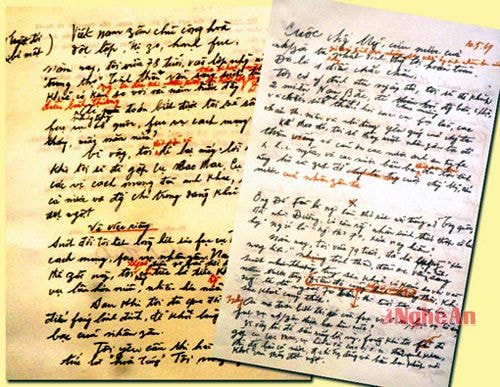About the word "rank" in Ho Chi Minh's Will
(Baonghean) - Pondering over Ho Chi Minh's handwriting when he drafted, reread, and edited the document "Absolutely Secret" (Will) from the beginning of 1965, through 1966, 1967, especially 1968, until May 10, 1969, we realized that his use of words and sentence selection was extremely elaborate, careful, and truly profound. Many meaningful details and problematic dimensions emerged from this aspect. In the article, we only discussed the word "class" when he declared himself "This year, I am 79 years old, already a rare person" (Will, dated May 10, 1969).
In the Will typed in early 1965 “on the occasion of my 75th birthday”, revised on May 15, 1965, he used the word “class” to talk about himself: “…This year, I am 75 years old. My spirit is still clear, my body is still healthy. However, I am also a “rare” class of people. The re-readings in 1966, 1967, and even 1968 had many corrections and additions, but in the introduction, Ho Chi Minh still kept the word “class”: “This year, I am just 78 years old, in the class of “middle-aged” people. My spirit is still very clear, although my health is worse than a few years ago”.
 |
| President Ho Chi Minh's handwritten will. |
Only until May 10, 1969. That day, "President Ho Chi Minh held the 16th Central Executive Committee meeting. At the break time, he asked to leave early. From 9:30 to 10:30, President Ho Chi Minh revised his Will. He wrote the entire opening paragraph of the Will on the back of the Special Reference News of the Vietnam News Agency published on May 3, 1969" (According to the Electronic Newspaper of the Communist Party of Vietnam, June 16, 2009). He changed the word "class" to "rank" by writing over it. (Note: “class” consists of three letters, “rank” consists of four letters, so the letter “g” is close to the letter “ng”): “This year, I am 79 years old, a rare person, but my spirit and mind are still very clear, although my health is worse than a few years ago. When people are over 70, the older they get, the worse their health becomes. That is not surprising.”
Also, it should be added that the full text of President Ho Chi Minh's Will, dated: Hanoi, May 10, 1969, announced by the First Secretary of the Central Executive Committee of the Vietnam Workers' Party, Le Duan, at his funeral (maybe by mistake?), still states "class" (According to the document of the Government Electronic Newspaper of the Socialist Republic of Vietnam, August 21, 2014).
Why, after nearly 5 years of drafting and editing “Absolutely Secret” (Will) until May 10, 1969, only 4 months before his death, did Ho Chi Minh change and replace the word “class” with the word “rank”? We think: “class” (in “class of people”) seems to only refer to age groups (for example: youth class, young adult class, elderly class…) and the order of human life (for example: children and grandchildren class…). As for “rank”, in Vietnamese, it carries the nuance and expressive meaning: high and low hierarchy (often used to refer to low levels, for example, common class…) and evaluation, classification, and even expressing contempt.
Ho Chi Minh said that he was a "class of people" (rare in the past and present) which meant placing himself in the crowded world of ordinary people, common people, and ordinary people... Throughout his life, especially during the nearly 5 years of writing his Will, he thought a lot about people, Vietnamese people in history, especially the people who suffered so much pain and loss in the two wars against France and the US!
In Ho Chi Minh, the way of living close to the people, like ordinary people, was expressed frequently and very naturally. Once when visiting Indonesia, during the time of President Sukarno, the government reserved a grand hall for President Ho to meet our overseas Vietnamese. But surprisingly, the room became crowded because the young and old, men and women of overseas Vietnamese came in large numbers. Without hesitation, he left his table, walked out onto the wide lawn in front, took off his rubber sandals and sat down, our overseas Vietnamese gathered around him. An Indonesian poet witnessed that scene and was inspired to write a poem titled (translated) “The inner beauty of the pearl”, which includes the following lines:
People who do not like to sit in the seat of honor and admiration
Sitting there, with Him, means nothing.
…People like to sit at the same height as those around them.
The word “class” has expressed the ideology and morality of Ho Chi Minh. It has deep roots in his lifestyle, character and philosophy of “People are the root”. But within the scope of this article and due to the limitations of our understanding, we cannot say it all.
Meritorious Artist Le Thai Phong






